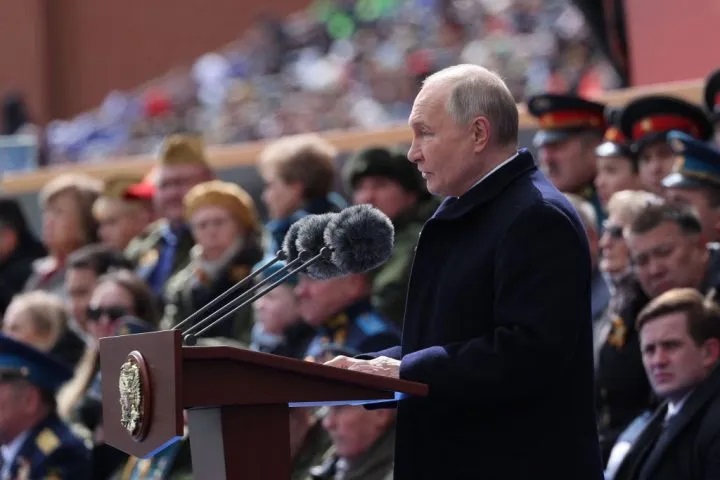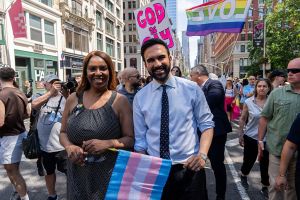Stepping out onto Red Square for today’s Victory Day parade in Moscow, it was clear to see that Vladimir Putin was in a good mood. Arms swinging with almost comic vigor as he walked, he sat down in the stands above Lenin’s mausoleum with a smug smile on his face. The pathetic fallacy of the flurries of snow on this uncharacteristically cold day were not going to interfere with his glee.
The Russian president has reason to be cheerful: two days ago, he indulged in his fifth inauguration ceremony in the Kremlin, handing himself another six years in power. The war in Ukraine is currently working in his favor; Ukraine has been struggling with a lack of troops, weapons and funding that has made repelling the advancing Russian troops increasingly difficult.
Although it’s meant to celebrate Russia’s victory over Nazi Germany, Putin has usurped the day’s meaning
Putin has always enjoyed the pomp and ceremony of Victory Day. As much as they may wish not to, the eyes of the world turn for an hour or so to Red Square — it is a day on which the Russian president knows he has the attention not just of Russians, but his enemies and allies across the globe.
As such, exactly two years ago today, just three months after Putin invaded Ukraine, the world was offered its first glance at the lens through which he viewed the conflict he had begun: ridding Ukraine of “Neo fascists;” defending Russia’s history and “traditional values” against the threat of Nato and the West more generally. These are themes Putin has returned to time after time in the many speeches he has given since.
Today, with two years of practice, those hateful themes ripened to maturity. “Today we see how the memory of World War Two is being distorted,” Putin launched in. “Revanchism, mockery of history, the desire to justify the current followers of the Nazis are part of the general policy of Western elites to incite more and more regional conflicts,” he fumed. By now, the Russian public understand these references perfectly well — there is no need for Putin to provide rambling explanations.
Ironically, though, Putin then launched into the exact revanchism of which he had just complained. Claiming the West would “like to forget the lessons of World War Two,” he stated: “The first three long, difficult years of the Great Patriotic War, the Soviet Union and all the republics of the former Soviet Union fought the Nazis almost one on one, while almost all of Europe worked for the military power of the Wehrmacht.”
This is a regurgitation of the Soviet narrative of World War Two, which conveniently chose to forget that until 1941 the USSR was allied with Nazi Germany under the Molotov-Ribbentrop pact. It was only the point at which Hitler turned on Stalin in 1941 that the Soviet Union liked to consider the formal beginning of the conflict. Far from working for Hitler, by that time most of Europe lay under Nazi occupation. Putin repeated this narrative with the aim of reinforcing his own message: that once again it is Russia against the world — only this time in Ukraine.
This year’s Victory Day parade is a useful milestone for recognizing the extent to which Russia has now slipped into what could reasonably be called a military dictatorship. The display of power provided by 9,000 frogmarching troops, all saluting Putin, is designed as an outward projection of the president’s own power. Although nominally a memorial day celebrating Russia’s victory over Nazi Germany, Putin has usurped the day’s meaning: Victory Day has now become inextricably linked with the war in Ukraine. The day now provides Putin’s rule with purpose and meaning.
Less can be said of the power of the weaponry that trundled through Red Square after Putin’s speech finished. For the second year in a row, the Russian army was able to spare just one tank for the parade: an eighty year old T-34. The rest are clearly tied up on the Ukrainian front. In total, just over sixty pieces of military equipment took part in the parade, including Iskander and Yars missile systems and Tiger, Kamaz and Ural armored vehicles. A fly-by of fifteen jets wrapped up the seven-minute procession (much shorter than in pre-war times), painting the sky over St. Basil’s Cathedral in the colors of the Russian flag. While the Russian air force has experienced difficulties getting through Ukraine’s anti-aircraft protections, today’s display suggests they still have plenty of aircraft at their disposal.
Despite Putin’s assurances that “we are confident that together we will ensure a free, safe future for Russia, our united people!,” the bravado seen in Russia’s capital has seemingly failed to trickle through the rest of the country. According to the Kremlin-critical Russian language TV channel TV Rain, fifty-four local authorities refused to hold their own parades for fear of being targeted by Ukrainian-sympathetic drone attacks. Many towns have reportedly canceled their traditional evening firework displays for similar reasons.
Over two years into the war in Ukraine, Russia’s Victory Day no longer truly celebrates the genuine triumph over fascism seen in 1945. The irony of the fascistic state Putin has cultivated in Russia is something he cares little for. With the eightieth anniversary of the end of World War Two approaching next year, the Russian president will only use it as another opportunity to paint himself as the isolated crusader out to save the world against itself.
This article was originally published on The Spectator’s UK website.


























Leave a Reply